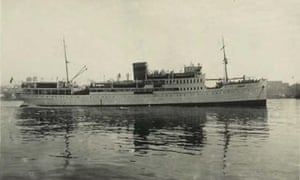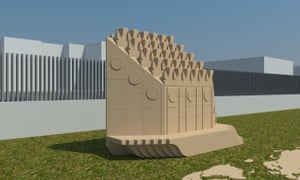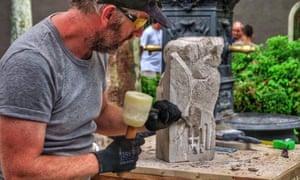Exactly how many died will probably never be known. But history records that at least 45 men drawn from countries all over the world were killed on 30 May 1937 when their ship, the Ciudad de Barcelona, was torpedoed off the coast of Catalonia by a submarine.
The men were among 300 International Brigadistas heading to Spain to fight for the Republican cause against Spain’s fascist-led Nationalist forces.
Fishermen living near the coastal town of Malgrat de Mar in Barcelona province helped save more than 120 men, but scores were trapped below as the ship went down. Witness accounts say the brigadistas sang the Internationale as they sank. At least 23 of the survivors were later killed in the civil war.
“It was late afternoon,” recalled Alun Menai Williams, a Welshman who wrote a book about his experiences, From the Rhondda to the Ebro. “I was leaning on the ship’s rail taking in my first view of Spain and its shoreline, some one and a half miles in the distance, when there came one hell of an almighty bang. The ship shook, tried to get airborne, before settling down at a crazy angle.”
“It was a pretty dirty business,” another survivor, an American named Jack Freeman, said. “Some fellows were killed while they were asleep, some were trapped below decks.”
Memory of the tragedy, as with many other stories from the Spanish civil war, was suppressed under General Franco. But now a British-born sculptor based in Catalonia is to create a lasting memorial to the brigadistas and the rescuers.

When finished, Solidarity Park will consist of 60, half-metre tall sculpted figures, carved in local limestone. The figures, representing the brigadistas, will be portrayed singing aboard an abstract interpretation of a ship which has seating designed as waves and will be situated on top of a stone patio map of the world.
Its creator, Robert MacDonald, originally from Rugby in Warwickshire, said the sculpted figures will be identical in form, representing “the unity of the struggle of the Brigadiers, but each will have individual carved features thus expressing the diversity of us all”.
The project, which MacDonald hopes will be completed by the end of May next year, to mark the 82nd anniversary of the sinking, will be a collaborative effort involving students, historians, local people and the families and friends of the brigadistas.
Public workshops will encourage people to help carve the sculpture which will be displayed in a small park on the beach at Malgrat de Mar. So far more than €13,500 has been raised via a crowdfunding campaign towards the estimated €20,000 costs of the project.
“This is a memorial and a project for everybody,” MacDonald said. “That’s why I don’t want to go into my workshop, tap away and present something. I want people to say ‘I helped make that, that’s my history.’
“Participation is really important. Art in a sense is slightly in jail in society. It’s behind locked doors. For me community art isn’t like pottery class on Tuesday night. It’s about people creating something that has political and cultural significance. I don’t think art exists like this in the true sense these days.”

MacDonald said the project was about using art to expose the truth. “This project is also about uncovering the history and the more noise we make, the more we find out.”
He had decided on the project after reading about his namesake who died when the ship went down. “It blew me away. Here’s this guy, Rob Macdonald, who was 23 years old, who didn’t get to the Spanish civil war, who put his life on the line. He had pretty much the same politics as me. One of the journeys for me with this project was finding his family and learning a little bit about him. He’s an individual I have a really powerful connection with.”
MacDonald hopes the work will encourage people to think about the treatment of foreigners, immigrants and refugees at a time when tensions appeared to be rising.
It’s a story that is relevant to many situations in the world at the present time. “For me as an artist, our job is to say things in a different way to help people to actually see it,” he said.

When asked if there was a shortage of memorials to the civil war in Spain, MacDonald said: “I would say there’s a shortage of understanding of what took place. That’s why I’m opening up the memorial process. If it’s going to be a memory of the people then people should do it. How do you think Easter Island was done? The whole community was involved.”